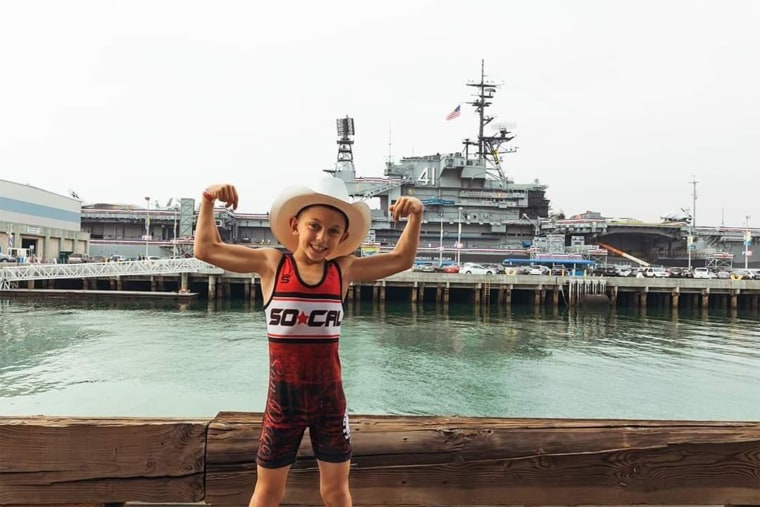Soon after professional photographer Andrea Van Wagner posted pictures of her 9-year-old son in his wrestling singlet on her public Instagram page last week, she made a disturbing discovery.
Now she is hoping to raise awareness about what can happen to even innocuous photos of kids online.
The mother of two from Chula Vista, California, posted some photos on Instagram from a youth wrestling event of her son, Cole, and his teammates. Then, she noticed she had been followed by an Instagram account with the handle "ilikestrongkids50."
The page was private, but after a few days the owner accepted her as a follower.
"It was creepy,'' she told TODAY Parents. "There were like 4,000 pictures of all these kids, all very athletic with their shirts off and some doing modeling poses or flexing their arms. The pictures themselves individually weren't bad pictures, but when you see someone who had a collection of 4,000 in one spot, that is disturbing."
Van Wagner, 36, also saw two photos of her son, Cole, that were simply lifted off her Instagram page.
"I saw a bunch of people liking his picture and they were all older men,'' she said. "I went on their pages and it was like fetish pages and other weird stuff."
She contacted the person behind the "ilikestrongkids50" page asking why he had pictures of her son and other half-naked kids.
"His response was, 'I don't post pornography,''' she said. "I asked him why he started the Instagram account, and then he immediately blocked me."

Van Wagner took screengrabs of his page and went on her Facebook page and a wrestlers-only group on Facebook to inform other parents.
"In our wrestler group, the parents found out he was following several of their kids and had their pictures,'' she said.
Van Wagner said she reached out to Instagram but, she said, she was told she had to prove the photos were of her child and get a specific link to the image on the page in question. But she no longer had access to the page because she was blocked.
She also filled out a report with the Chula Vista Police Department, which she said told her there was no crime committed because it was not pornography. At most, there could be copyright issues with using her professional shots of her son and his teammates, she said the police department told her.
One hundred parents reported the page to Instagram, and a local TV station in San Diego that Van Wagner had reached out to about the story contacted the company, too.
A spokesperson for Instagram told TODAY Parents that they removed the account "for violating our policies, specifically using our products with the intention of sexualizing minors."
"I'm just letting other parents know because you will see some hashtag their kids in photos with things like #sexykid or #childwithabs, and parents might not think anything of it, but it just gives pedophiles more access quicker to the pictures they want,'' Van Wagner said. "Parents should just have an awareness and be looking through who is following your page."
Van Wagner keeps her Facebook page private but said she will keep her Instagram page public because it features photos from her business.
Dona Fraser, the vice president of the Children’s Advertising Review Unit, which is part of the Better Business Bureau and promotes responsible advertising to children, gave this advice to TODAY Parents:
- Don't tag photos. The location data in a tag can allow strangers online to know where your child is, so at the very least don't tag the location until you've already left. Be mindful of what's in the background of a photo because that can also assist in locating a child.
- Consider whether other people's children are in the photos. They may not want their child's photo to be posted online, so either find different photo or blur the other faces.
- Keep in mind that a child's photo can be manipulated. Predators and pedophiles could use it in a way that's inappropriate.
"If the parent feels compelled to create an online profile for their child, they should be sure to keep the account private and available only to family and close friends,'' said Fraser. "If creating a profile for a child, the parent needs to determine when the cut-off is for pulling that profile down because at some point the child may not want the information posted for anyone to see, no matter how private it may be."
Parents should also be aware of what companies are doing with information about their kids.
"Companies are collecting all sorts of data, whether it’s the picture of the child’s first steps or their first day of kindergarten,'' she said. "All of that data can be compiled to create an online profile of your child and sold to companies for marketing purposes."
Fraser also notes that children under 13 should not have access to social media apps.
"Most of these platforms comply with the federal Children’s Online Privacy Protection Act which, in part, prevents the collection of information from children under 13 without prior consent from their parents,'' she said. "Beyond the simple age restriction, there are reasons why these platforms are not intended for younger children and parents should educate themselves about these platforms before simply allowing their children to create accounts and engage."
If parents decide to let their children to use social media, they should check whether the accounts can be made private.
"We all know kids are savvy and will find workarounds on the types of settings parents set, but again, this is an opportunity for parents to create 'house rules' for their child’s online engagement,'' Fraser said. "Unfortunately parents cannot leave their child’s online privacy solely up to the platform. Parents must do their homework."